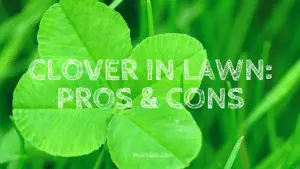When people see vegetation growing in their lawn other than desirable grass blades, they tend to assume that these plants or weeds are bad. This includes clover.
Companies that manufacture weed killers have capitalized off of getting homeowners to eliminate clover from their lawns. There are many products that advertise on the packaging their ability to eliminate clover.
These companies have, at least partially, been responsible for shifting the trend toward eliminating clover. Go back to the early 1950’s and clover was actually a common component in lawns.
So, what’s the real story? Is clover good, bad, or something in between when it comes to a lawn. Let’s take a closer look at clover to pinpoint some of the major advantages and disadvantages of it in the lawn.
Table of Contents
Advantages of Clover
Beautiful Green
Clover tends to be a beautiful green color similar to a well fertilized lawn. From a distance, it can fool the observer into believing the clover is actual a lush lawn. In certain lawns, killing off the clover may be detrimental to the overall appearance of the lawn.
For example, many years ago I moved into my first home, which had very little quality grass and was overtaken by clover in several areas. I made the mistake of killing off the clover without a plan to renovate the lawn after the clover was killed. Needless to say, the lawn looked much worse after the clover was killed until fall rolled around to where I could overseed and reestablish a lawn.
Handles Droughts
Another advantage of clover is that it has the ability moderately tolerate drought conditions. It does tend to die off in extreme conditions, but it will often remain green even in harsh summer weather. It is not uncommon for the clover to remain green while the grass has browned.
Nitrogen Fixation
One of the primary benefits of clover is that it has the ability to fix nitrogen. In other words, it takes a significant amount of nitrogen from the air and uses that nitrogen for growth.
Nitrogen is a key ingredient in lawn fertilizers that is absorbed in soil through the grass roots to help with growth and color. So the big question is, does clover help add nitrogen to the lawn soil to help feed the grass roots.
The University of Arkansas states that large portion of nitrogen is in the top growth of clover. Therefore, the grass will receive nitrogen as the topgrowth of the clover dies and falls into the soil.
Clover will not take the place of regular lawn fertilization. However, it can benefits the lawn to a certain degree.
Crowds Out Weeds
Weeds tend to thrive in the direct sunlight in spaces where the soil is not crowded with other vegetation. Clover provides a blanket of coverage over the lawn to help shade out other weeds from growing.
Low Maintenance
Clover, such as the common white clover, does not grow excessively in an upward direction. Mowing and watering requirements are minimal.
Additionally, as stated earlier, clover does not require fertilizer to maintain it vibrant color due to its ability to essentially fertilize itself.
Clover is a much more “plant it and forget it” compared to grass. Having clover in the lawn will not pose significant problems in terms of upkeep.
Dog Urine Damage Resistant
Most dog owners are familiar with the difficulties involved in keeping a pristine lawn with a dog roaming the yard. Lawn problems arise from the waste the dog leaves behind.
Dog urine has an abundance of nitrogen. When the grass receives too much of this nitrogen, it will burn the lawn causing it to turn brown. A benefit of clover is that it holds up extremely well against dog urine.
Sun & Shade Growth
Clover has the ability to survive in both sunny and shady areas. Generally, they prefer full sun to slightly shady, but they can tolerate shady conditions with as little as about four hours of sunlight per day. Clover may grow in areas where certain grass may not, making it a good alternative to adding green to these areas.
Grows Where Grass Will Not
Clover is much more tolerant to varying soil conditions compared to many types of grass. Clover has the ability to fill in the bare spots where grass will just not grow.
Disadvantages of Clover
Bees
When clover blooms, it is not uncommon for bees to be attracted to the flowers. Households with kids or people who are outside frequently (especially barefoot) may not favor clover in the yard because of the bees.
Appearance
Blame the lawn fertilizer/weed control companies all you want, but the “ideal lawn” has now become one that is free of everything but lush green grass. Clover has no place in many yards due to personal tastes. The desire to eliminate clover creates a situation where lawn chemicals need to be used for this purpose. This, of course, can be bad for the environment.
Durability
Clover does not tend to withstand heavy traffic compared to grass. A clover filled lawn with the kids playing sports on it routinely is not going to hold up like grass. However, clover mixed into the grass will do well against traffic.
No Blanket Weed Killer
If you are looking to keep clover around, you typically cannot use a blanket coverage of weed killer. For example, Scott’s Turf Builder Weed & Feed, which is placed over the lawn with a spreader and is known for its ability to kill off clover. You will have to spot spray or physically pull undesirable weeds by hand to minimize the damage to the clover.
Conclusion
The advantages of clover in the lawn outweigh the disadvantages. However, a huge factor is tolerance for it in regard to appearance. Many people perceive clover as a weed-like plant that is visually undesirable. Others have a yard full of clover and love its appearance. As with many things in life, it is best to go with what you personally enjoy whether it fits into the status quo or not.


